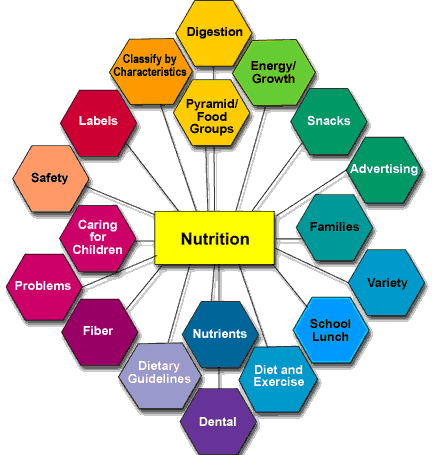Nutrition
Definition[edit | edit source]
According to the world health organisation, nutrition is defined as: "Nutrition is the intake of food, considered in relation to the body’s dietary needs. Good nutrition – an adequate, well balanced diet combined with regular physical activity – is a cornerstone of good health. Poor nutrition can lead to reduced immunity, increased susceptibility to disease, impaired physical and mental development, and reduced productivity."[1]
Physical therapist role in nutrition[edit | edit source]
The principles of Physiotherapy is based on movement sciences and aims to restore function of multiple body systems[2]. Physical therapists/ Physiotherapists are committed to improve and promote wellness[3], general health, lifestyle and quality of life. In some cases it is also their role to reverse and manage lifestyle related conditions with non-pharmacological interventions. They are well positioned as established healthcare practitioners, to provide clinically relevant patient education with long-term health benefits as well as lifestyle behaviour changes to improve their general health and physical therapy outcomes.[4]
Unhealthy lifestyle behaviours are primary contributors to the prevalence of lifestyle- related conditions, To manage a patient as a whole with an holistic approach makes it essential for physiotherapists to have the basic knowledge about the role of nutrition in these lifestyle conditions, as well as understand the effects of a successful behaviour change.
Lifestyle behaviours include:
- tobacco use/ smoking
- sedentary lifestyles (inactivity)
- poor nutritional intake
- elevated stress
- suboptimal sleep
- obesity
Preventable lifestyle conditions include:
- Ischaemic heart disease
- hypertension
- stroke
- type 2 diabetes mellitus
- cancer (some cases)
- emphysema
Physiotherapists role in providing specific nutritional or dietary advice[edit | edit source]
Physical therapists/ Physiotherapists without the necessary nutrition-related education are not allowed to give dietary advice, but play a vital role in the screening and referring of patients that are in need of dietary advice or who can benefit from it. Many conditions managed and seen by physiotherapists are directly affected by diet and nutrition.
Related Pages and documentaries[edit | edit source]
Fat, Sick and Nearly Dead (Free on Netflix) Amazon reviews
Food Matters (Free on Netflix) Amazon reviews
Food Inc (Free on Netflix) Amazon reviews
Forks over Knives (Free on Netflix) Amazon reviews
References[edit | edit source]
- ↑ World health organisation. Accessed: 3 March 2019. Available at:https://www.who.int/topics/nutrition/en/ .
- ↑ Khalid MT, Sarwar MF, Sarwar MH, Sarwar M. Current role of Physiotherapy in response to changing healthcare needs of the society. International journal of education and information technology. 2015. Vol 1 No 3, pages 105-110.
- ↑ Burniston J, Eftekhari F, Hrabi S, Worsley R, Dean E. Health behaviour change and lifestyle-related condition prevalence: Comparison of two epochs based on systematic review of the physical therapy literature. Hong Kong Physiotherapy journal. 2012. Vol 30. Pg 44-56.
- ↑ Alexander J, Bambury E, Mendoza A, Reynolds J, Veronneau R, Dean E. Health education strategies used by physical therapists to promote behavioural change in people with lifestyle-related conditions: A systematic review. Hong Kong Physiotherapy journal. 2012. Vol 30. Pg 57-75.







